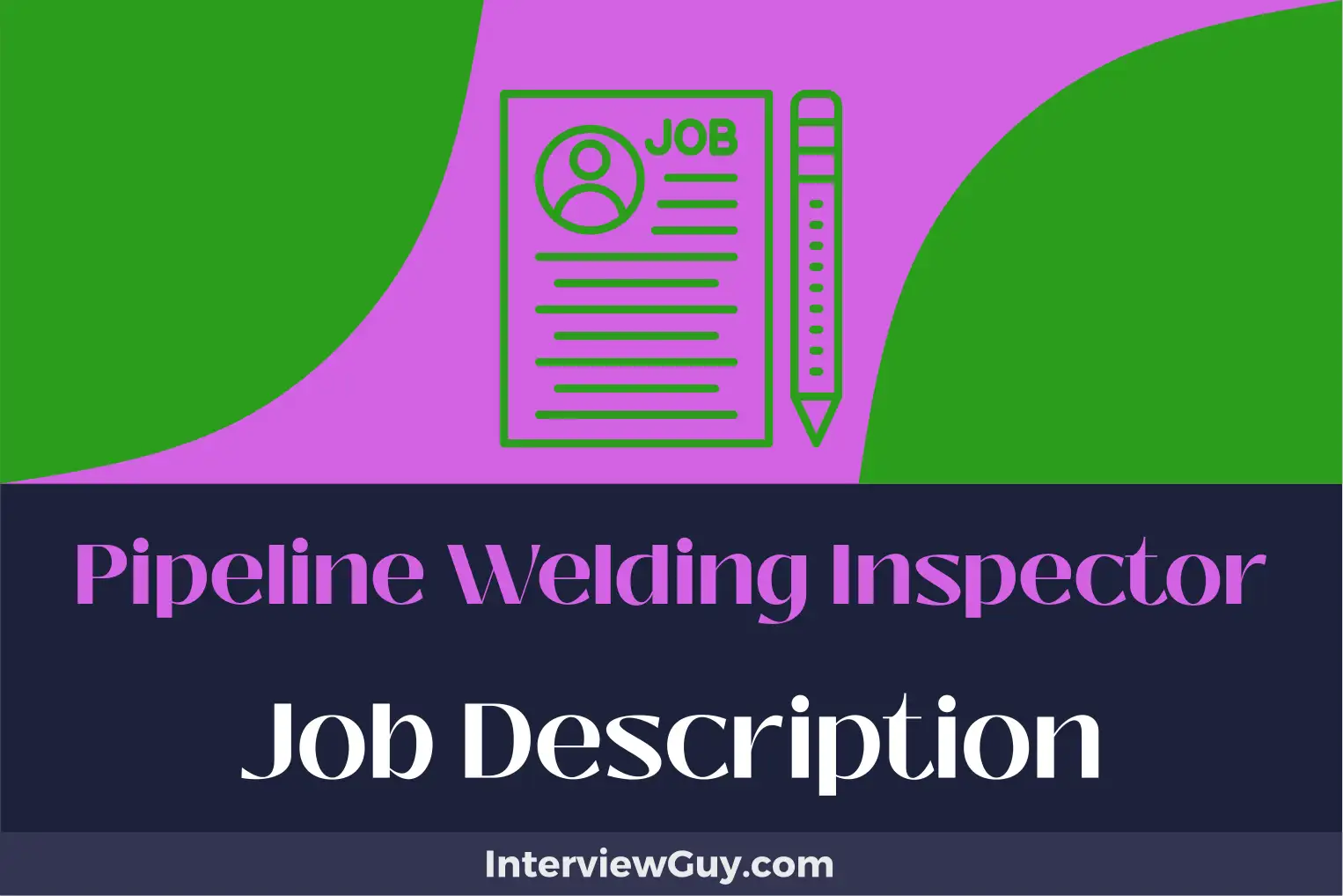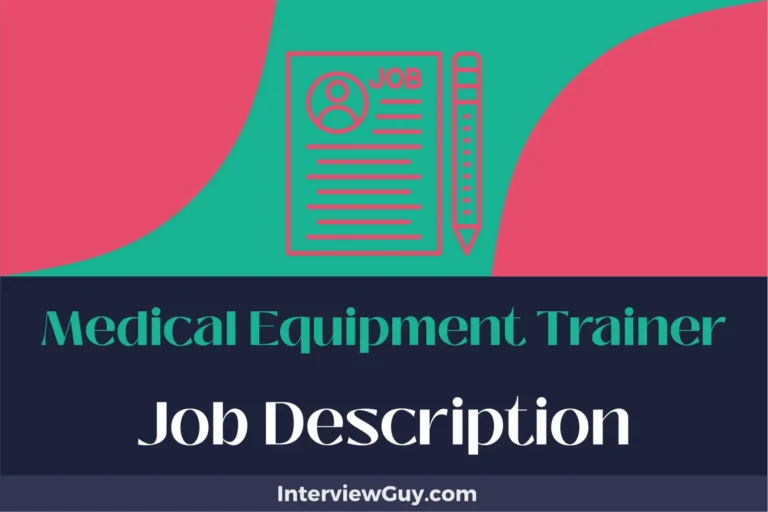Pipeline Welding Inspector Job Description [Updated for 2026]

In the era of infrastructure and development, the focus on pipeline welding inspectors has never been more pronounced.
With the continued advancements in construction and energy sectors, the demand for skilled professionals capable of inspecting, assessing, and ensuring the safety and integrity of our pipeline systems grows.
But let’s delve deeper: What’s really expected from a pipeline welding inspector?
Whether you are:
- A job seeker trying to understand the core of this role,
- A hiring manager outlining the perfect candidate,
- Or simply intrigued by the intricacies of pipeline welding inspection,
You’re in the right place.
Today, we present a tailor-made pipeline welding inspector job description template, created for convenient posting on job boards or career sites.
Let’s get started.
Pipeline Welding Inspector Duties and Responsibilities
Pipeline Welding Inspectors are responsible for overseeing and ensuring the quality and safety of welding work performed on pipelines.
They conduct inspections, review welding procedures, and document their findings.
Their duties and responsibilities include:
- Inspecting pipelines, equipment, and welding work to ensure compliance with safety standards and regulations
- Evaluating welding procedures and offering recommendations for improvement
- Conducting tests to evaluate weld quality and strength
- Identifying and documenting any defects or abnormalities in welds or equipment
- Using various testing methods, including visual inspections, non-destructive testing, and destructive testing to assess weld quality
- Collaborating with welders and other personnel to address issues found during inspections
- Preparing and maintaining accurate and detailed inspection reports
- Staying up-to-date with industry standards and changes in welding technologies and techniques
Pipeline Welding Inspector Job Description Template
Job Brief
We are looking for a dedicated and skilled Pipeline Welding Inspector to join our team.
The Pipeline Welding Inspector will be responsible for inspecting and ensuring that all welding work done on our pipelines meets the necessary safety standards and regulations.
The ideal candidate will have a strong understanding of welding techniques, excellent attention to detail, and an unwavering commitment to safety.
Knowledge of relevant health and safety regulations and the ability to identify potential issues before they become problems are also key for this role.
Responsibilities
- Inspect and assess the quality of welds on pipelines.
- Ensure adherence to all relevant safety regulations and standards.
- Document inspection results by completing reports, summarizing re-works, and wastes, and inputting data into quality database.
- Monitor welding processes to avoid overheating or distortion of pipelines.
- Communicate regularly with project managers and construction crew about safety and quality control.
- Provide guidance and supervision to welders as necessary.
- Review and interpret blueprints and project specifications.
- Identify and report potential safety hazards or structural concerns.
- Coordinate with third-party inspection representatives as required.
Qualifications
- Proven work experience as a Welding Inspector or similar role.
- Professional certification in welding inspection (e.g. CWI, CSWIP).
- Understanding of pipeline construction processes and welding techniques.
- Knowledge of relevant health and safety regulations.
- Excellent observation skills and attention to detail.
- Ability to interpret blueprints and technical documents.
- High school diploma or equivalent. A degree in a relevant field is a plus.
Benefits
- 401(k)
- Health insurance
- Dental insurance
- Retirement plan
- Paid time off
- Professional development opportunities
Additional Information
- Job Title: Pipeline Welding Inspector
- Work Environment: Mostly outdoors at construction sites. Protective clothing and equipment is often required. Some travel may be necessary.
- Reporting Structure: Reports to the Construction Manager or Site Supervisor.
- Salary: Salary is based upon candidate experience and qualifications, as well as market and business considerations.
- Pay Range: $52,056 minimum to $78,735 maximum
- Location: [City, State] (specify the location or indicate if remote)
- Employment Type: Full-time
- Equal Opportunity Statement: We are an equal opportunity employer and value diversity at our company. We do not discriminate on the basis of race, religion, color, national origin, gender, sexual orientation, age, marital status, veteran status, or disability status.
- Application Instructions: Please submit your resume and a cover letter outlining your qualifications and experience to [email address or application portal].
What Does a Pipeline Welding Inspector Do?
Pipeline Welding Inspectors work primarily in the oil, gas, and utilities industries, overseeing the safety and quality of welded pipelines that transport materials.
They are responsible for inspecting and ensuring the welding work done on pipelines meets the industry’s specific standards and safety regulations.
This involves closely monitoring the welding process, from the preparation of the materials to the completion of the weld.
Inspectors perform visual and non-destructive tests to determine the integrity and durability of the weld.
They identify and report any defects, such as cracks or distortions, that could compromise the pipeline’s safety or effectiveness.
They also review welding procedure specifications and the qualifications of welding operators to ensure they are in line with the project requirements.
Pipeline Welding Inspectors also play a key role in the maintenance of existing pipelines, conducting routine inspections to identify and report any potential issues or hazards.
They must document their findings accurately and provide detailed reports, which can be used to make informed decisions about pipeline repairs or replacements.
In some instances, they may be responsible for ensuring corrective actions are undertaken to resolve any identified problems with the pipeline’s welding.
They work closely with other professionals, such as pipeline engineers and safety officers, to ensure the overall safety and efficiency of the pipeline system.
Pipeline Welding Inspector Qualifications and Skills
Pipeline Welding Inspectors need to have a specialized set of skills and qualifications to ensure the quality and safety of pipeline projects, such as:
- Thorough understanding of pipeline welding techniques and procedures to inspect the quality of welds and ensure they meet all necessary standards and specifications.
- Strong technical skills to use various inspection tools and equipment, such as ultrasonic and radiographic testing equipment.
- Excellent attention to detail to identify any defects or inconsistencies in welds that could compromise the integrity of the pipeline.
- Strong knowledge of relevant safety protocols and regulations to ensure all welding work is carried out safely and in compliance with these rules.
- Ability to read and interpret blueprints, schematics, and welding procedure specifications to understand the specific requirements of each pipeline project.
- Effective communication skills to report findings, give feedback to the welding team, and collaborate with other inspectors and project managers.
- Problem-solving skills to recommend corrective actions or adjustments to welding processes when quality issues are identified.
- Physical stamina to work in various weather conditions, stand for long periods, and navigate around pipeline construction sites.
Pipeline Welding Inspector Experience Requirements
A Pipeline Welding Inspector typically requires a minimum of 2 to 3 years of experience in welding inspection, preferably in the field of pipeline construction.
This experience can be gained through roles such as Welding Technician, Welding Supervisor, or Welder.
During this time, candidates should have developed an understanding of welding processes, welding metallurgy, and pipeline construction.
They should have hands-on experience in performing visual inspections of welds, interpreting pipeline construction drawings, and using testing equipment.
Candidates with around 5 years of experience may already have a strong foundation in pipeline welding inspection.
They should have deep knowledge in welding codes and standards, as well as experience in complex inspection activities such as radiographic testing, ultrasonic testing, and magnetic particle inspection.
Those with more than 7 years of experience might possess leadership experience, having overseen teams of welders or inspection personnel.
They may be ready to handle senior roles, managing inspection procedures, and coordinating with contractors and clients.
Moreover, it is beneficial for a Pipeline Welding Inspector to have a relevant certification such as Certified Welding Inspector (CWI) or Certified Pipeline Welding Inspector (CPWI), which demonstrates their proficiency and experience in this role.
Pipeline Welding Inspector Education and Training Requirements
Pipeline Welding Inspectors are generally required to have a high school diploma or equivalent education.
Many also possess a technical certificate, associate’s degree or completed apprenticeship in welding, mechanical engineering or a similar field.
Extensive on-the-job training is common, but formal training programs can provide a comprehensive understanding of welding principles, safety protocols, and inspection techniques.
In addition to academic qualifications, these professionals typically need to obtain certification from an accredited organization like the American Welding Society (AWS).
The AWS Certified Welding Inspector (CWI) certification is a widely recognized standard in the industry.
Certain positions may also require knowledge of specific welding codes and standards, such as those laid out by the American Society of Mechanical Engineers (ASME) or the American Petroleum Institute (API).
Experience in the field is highly valued, with many employers preferring candidates with several years of hands-on welding and inspection experience.
Continuing education is important for keeping up with technological advancements and changes in industry standards.
Many inspectors pursue advanced courses or certifications to enhance their skills and knowledge.
Pipeline Welding Inspector Salary Expectations
A Pipeline Welding Inspector can expect to earn an average salary of $72,500 (USD) per year.
However, the actual earnings can differ based on factors such as industry experience, certification levels, geographical location, and the employing company.
Pipeline Welding Inspector Job Description FAQs
What skills does a Pipeline Welding Inspector need?
A Pipeline Welding Inspector needs to have a deep understanding of welding processes, materials, and safety standards.
They should have keen observational skills and pay attention to detail to ensure that all welds meet the required specifications and safety standards.
Basic computer skills and the ability to interpret blueprints, diagrams, and welding procedure specifications are also required.
Do Pipeline Welding Inspectors need a degree?
While a degree is not strictly necessary for this role, many employers prefer candidates with a bachelor’s degree in welding technology or a related field.
Additionally, certifications such as Certified Welding Inspector (CWI) or Certified Pipeline Welding Inspector (CPWI) are often required.
What should you look for in a Pipeline Welding Inspector’s resume?
A Pipeline Welding Inspector’s resume should highlight their education and certifications in welding inspection, their experience in the field, particularly with pipeline projects, and their familiarity with the relevant safety standards and regulations.
Additionally, look for mention of skills such as detail orientation, problem-solving, and ability to work under pressure.
What qualities make a good Pipeline Welding Inspector?
A good Pipeline Welding Inspector is meticulously detail-oriented, ensuring that every weld meets the required specifications and standards.
They are adaptable, able to work under a variety of conditions and on different types of welding projects.
Excellent communication skills are also important, as they need to clearly report their findings and liaise with other team members.
Is it difficult to hire Pipeline Welding Inspectors?
Hiring Pipeline Welding Inspectors can be challenging due to the specialized skill set and experience required for the role.
It may be beneficial to work with a recruitment agency that specializes in this field to attract qualified candidates.
Offering competitive salaries and benefits, as well as ongoing training and development opportunities, can also help attract top talent.
Conclusion
And there it is.
Today, we’ve unraveled the intricacies of what being a pipeline welding inspector truly entails.
Surprising, isn’t it?
It’s not just about welding pipes.
It’s about ensuring safety, reliability, and quality in our vast network of pipelines.
Equipped with our handy pipeline welding inspector job description template and real-life examples, you’re ready to make your next move.
But why limit yourself?
Go further with our job description generator. It’s your ideal tool for creating meticulous job listings or perfecting your resume to the last detail.
Remember:
Every weld, every inspection, contributes to the larger safety framework.
Let’s build that secure future. Together.


![Corporate Yoga Instructor Job Description [Updated for 2026]](https://interviewguy.com/wp-content/uploads/2024/05/corporate-yoga-instructor-job-description-768x512.webp)

![Forensic Photographer Job Description [Updated for 2026]](https://interviewguy.com/wp-content/uploads/2024/07/forensic-photographer-job-description-768x512.webp)
![Event Technology Coordinator Job Description [Updated for 2026]](https://interviewguy.com/wp-content/uploads/2024/07/event-technology-coordinator-job-description-768x512.webp)
